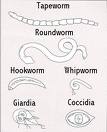A new pup is just like a new born baby............and needs a lot of care, time, energy, patience etc....
A good start is the best way to an healthy active adult dog. So on this page read about puppy care.
On this page we give you a little knowledge on the selection and initial care of a pup. So what are the signs of a good healthy pup. The first is that it has a good shine on the skin, free of scales and dryness, no discharge from the eyes, straight legs, no pot belly and an active nature. While selecting the best pup observe the following: never chose a pup that growls and runs back. The best pup will happily bound towards you. Overall one feels a sense of closeness to the pup. Never be in a haste to choose a pup. Consult a vet or knowledgeable pet owner. Ask the breeder about past litters, kennel club papers etc. Never choose a pup that is coughing, not eating, having high fever, loose motions or one that is very dull.
Primary care: After getting the pup home the first thing is to consult a veterinarian. Get a proper diet chart. The pup needs to be given medication for worms. The vaccinations need to be started on time either at four or six weeks. The first year has between six to eight vaccines depending on the pup and its breed. Never delay vaccinations. The pup is best given a bath after consultation with the vet. Never use human shampoos. Do not water enter the ear canal. Give a bath only twice a month. Groom your dog daily. Do not use powders on a wet dog.
Toilet training is very important. It is done by taking the pup out after every sleep cycle and every meal. That works out to at least ten times a day. Never procrastinate. Do not let the pup be taken out to a place where there are street dogs and infections till the vaccinations are complete. Wash any area that has been soiled by the pup accidentally by a strong disinfectant to get rid of the smell.
Diet : Choose either a good dog food that is commercially available or make a balanced home made diet. A good home made diet consists of proteins (cheese, dals, meat, boiled eggs etc), Carbohydrates (boiled potatoes, fruits etc.) and fats. Avoid chicken and fish bones, chocolates, salt, sweets, spices and oil. A balanced multi vitamin may be given to pups.
Training is very important and has been discussed on a separate page.
Vaccination schedule at our clinic
Weeks Vaccine Comment
4 Distemper/Parvo Optional
6 Corona Advisable
8 Distemper6/1 Compulsory
12 Distemper6/1/Rabies Compulsory
16 Distemper6/1/Rabies Compulsory
20 Corona Compulsory
Yearly Leptospira booster vaccination has been made compulsory at our clinic.


